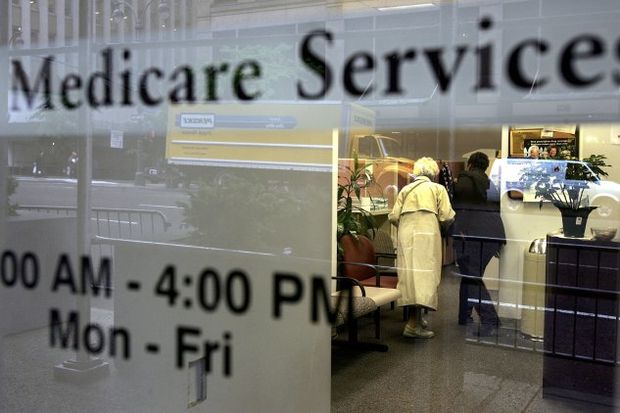Insurance Lobby Keeps Up Pressure on Defeating Medicare for All
- Companies investing more in government-backed private plans
- Medicare Advantage an `important framework,’ proponent says
The country’s largest insurance lobby made clear it is focused on defeating any plans to expand government-run health plans even as groups representing doctors are split on the issue.
Matt Eyles, president and chief executive office of America’s Health Insurance Plans, opened the group’s annual Medicare conference Monday in Washington listing what he saw as the successes of Medicare and Medicare Advantage, where private insurers partner with the government to cover seniors, and how single-payer proposals might threaten those successes.
Eyles said Medicare remains popular and proposals such Medicare for All, where the government would insure all Americans, have also been well received.

Photographer: Spencer Platt/Getty Images
The leader of health insurer lobbying group America’s Health Insurance Plans said his organization will oppose proposals for Medicare for All.
“It’s why proposals that bear a name like Medicare for All tend to poll so strongly with Americans, when they are given a tagline with no detail, but let’s not be hoodwinked by clever branding,” Eyles said. “The greatest innovations in Medicare are being created and led by health insurance providers and their partners.”
Many Democrats are growing skeptical about Medicare for All, recent polling shows. A Des Moines Register and CNN survey of Democratic likely caucus-goers released Sept. 22 showed 41% said they want presidential candidates to advocate for Medicare for All. That’s down from a March poll of Iowans that found 49% supported it fully and another 35% who backed taking steps toward a government-run health system.
Nationwide, 56% of registered voters oppose a Medicare for All plan that would replace private insurance, a Sept. 13-16 Wall Street Journal-NBC News survey found.
AHIP is a central part of an industry lobbying coalition called the Partnership for America’s Healthcare Future that is opposing Medicare for All.While the American Medical Association, the nation’s largest doctors group dropped out of the group, the American Hospital Association and the Federation of American Hospitals remain in the group.
Quarter of Premiums
Insurers have the most to lose under Medicare for All or any other expansion of government insurance plans. The industry is a fan of Medicare Advantage and many major insurers are investing heavily into it.
Anthem now has more than 1 million beneficiaries in its Medicare Advantage plans, according to earnings reports. Humana has roughly 4 million people in its Medicare Advantage plans and UnitedHealth has 5.19 million in its Medicare Advantage plans.
Medicare Advantage premiums rose to $202.7 billion in 2017, or 24.5% of overall industry premiums, from $69.9 billion in 2007, or less than 17% of overall industry premiums, according to an A.M. Best Company report from 2018.
Eyles said the vast majority of seniors in Medicare Advantage plans are happy with their insurance and the program providers “an important framework” policymakers should work from.
“In that framework, public programs leverage health insurance providers to ensure high-quality, help control costs, encourage innovation, and drive to value,” he said.
Douglas Holtz-Eakin, president of the conservative American Action Forum and former head of the Congressional Budget Office, similarly spoke at AHIP’s Medicare conference against Medicare for All. He said expanding Medicare would mean rationing care in rural areas due to lower reimbursement rates for doctors and hospitals.
“You’re going to ration it in rural areas,” he said.
To contact the reporter on this story: Alex Ruoff in Washington at aruoff@bgov.com
To contact the editors responsible for this story: Paul Hendrie at phendrie@bgov.com; Jonathan Nicholson at jnicholson@bgov.com; Robin Meszoly at rmeszoly@bgov.com